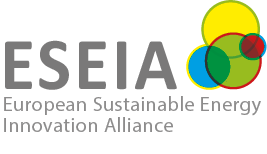SOCIETAL ENERGY
“Policies, drivers and barriers for innovation in renewable energies” – October 2015 – Yoram Krozer, University of Twente – CSTM, the Netherlands
“From CSR to Eco-innovators” – July 2014 – Yoram Krozer, University of Twente – CSTM, the Netherlands
Making a case for moving from crafting a CSR strategy in the business practices to developing and delivering eco-innovations for the public and the private benefits.
“Demands for sustainable innovations” – July 2014 – Yoram Krozer, University of Twente – CSTM, the Netherlands
Drawing on sustainability demands and the current sustainale development debate and innovative practices, as well as considerations about the concept of welfare change.
“Innovations for sustainability” – July 2014 – Yoram Krozer, University of Twente – CSTM, the Netherlands
This presentation introduces the theory of behavioral and evolutionary innovation, demand-driven and supply-driven technology innovation, while also providing concrete examples of innovations in the energy sector.
“Policy and business for sustainable innovations” – July 2014 – Yoram Krozer, University of Twente – CSTM, the Netherlands
Analysing the progress achieved in the policy sector with regards to implementing sustainable development, and providing an overview of integrated business decision making that incorporates Life Cycle Costing (LCC).
“Community Initiatives for Renewable Energy” – Maarten Arentsen, Twente University, Netherlands
This lecture introduces the concept of Social Responsible Innovations (SRIs), pointing to its drivers and forms of manifestation.
“Competition between Renewable and Fossil Energy Technologies” – G. Jan Harmsen, University of Groningen, The Netherlands; Technical Sciences and Sustainable Development
This presentation focuses on scaling up the market uptake of renewables, and brings about valuable insights into the open innovation funnel concept.
“Ecological Truths and Myths of Renewable Energy”- Michael Narodoslawsky, Graz University of Technology, Austria
A sharp scientific analysis of the ecological myths of Renewable Energy, revisiting with a critical eye concepts such as ‘peak oil’, ‘energy scarcity’, ‘green agriculture’.
“Energy and Society – An Irish Perspective” – Gerard Mullally, University of Cork, Ireland
Critical perspectives on energy transitions in Ireland, accompanied by concrete examples.
“Energy and Society: The Great Transformation” – Marina Fischer-Kowalski, Institute of Social Ecology Vienna (SEC), Austria
Looking at lessons learned from the past, this presentation reveals the enabling factors for socio-ecological/socio-metabolic system transitions.
“Energy Poverty” – Günter Getzinger, IFZ – Inter University Research Centre for Technology, Work and Culture, Austria
A comprehensive multiple-scale perspective on energy scarcity: scaling down form the global level, to a European, national and regional dimension (Europe-Austria-Styria).
“European SET-Plan – Implementing Renewable Energies in Europe” – Martin Huemer, European Commission, DG Research and Innovation
An introduction to the EU Energy Policy and the European Strategic Energy Technology Plan (SET-Plan), the energy technology pillar for Europe, with an emphasis on their role in advancing the implementation of renewable energies.
“Hydro Power and Society – The Case of the City of Graz”- Urs Harnik-Lauris, Energie Steiermark
Build around a case study, this presentation sheds a light on the demand and supply of water and hydro-power energy resources for the citizens of Graz, Austria.
“Industry and Society on their way towards a Sustainable Energy Future” – Thomas Krautzer, Federation of Austrian Industries in Styria
This lecture is aimed at revealing the energy and climate challenges facing our society, while analysing the current state of business and taking a look into the future at our sustainable energy transitions.
“Norway on its Way towards Sustainable Energy” – Audun Ruud, Sintef, Norway
Introduces ways to reconcile environmental and energy policy objectives and how to increase lock-ins for Sustainable Energy System innovation. The overarching aim of the presentation is to offer a comparative perspective on Renewable Energy Policy in the EU and in Norway.
“Resource Planning in Regions” – Michael Narodoslawsky, Graz University of Technology, Austria
Lecture on the logistical and socio-political importance of planning at regional level.
“Strategic Planning for Europe’s Energy Future” – Karl Rose, World Energy Council, United Kingdom of Great Britain and Northern Ireland, Senior Fellow
This lecture is theme around foresight and crafting strategies in an uncertain world, with a view to climate policy debate and energy systems.
“Transformation to a 100% Renewable Energy System – Denmark as a Case Study” – Niels Meyer, TU Denmark
This lecture introduces a Danish case study, namely the Coherent Energy and Environmental System Analysis (CEESA) initiative, in order to outline different scenarios for out-phasing fossil fuels in all sectors of Danish energy supply.
“Transition to Renewable Energy Systems and the Need for Innovative Democracy” – Frede Hvelplund, Aalborg University, Denmark
Moving from the fossil fuels enrgy domination to the renewable energy era: the technical, economical and societal changes required.
“Will European Policy Rise to the Challenge of Energy Change?” – Miranda Schreurs, EU, EEAC
A holistic perspective on the sphere of influence of the EU Climate and Energy Policy, with a particular emphasis on the energy governance challenge.
“Innovative Business” -Maarten Arentsen, University of Twente
Business models: Methodoly, Society Readiness Level, Types of resistanc and company strategies.
“Interaction along the value chain” -Maarten Arentsen, University of Twente
“New Approaches to Innovation” – Manfred Spiesberger, Centre for Social Innovation – ZSI.
Examples of social innovation and open innovation. Insight into the EU Innovation Policy.
“Financing of innovations in energy efficiency and renewable energies: the example of Germany” – Julian Schoenbeck, EnergyAgency.NRW
Explanation of the various instruments for financing innovations in Germany.
“Forest Resource and Aspects of Forest-based Industries. A Selection of Numbers and Figures” – Alfred Teischinger, BOKU
“Biorefinery Engineering: A New Masters Program at Graz University of Technology” – Rene Eckhart, TU Graz
“Cascade use of non-wood biomass” – Alexander Jäger, University of Applied Sciences Upper Austria
“Lignin and its utilisation in Phenolic resins” – Elke Fliedner, Prefere Resins Germany GmbH
“Current developments of biobased commercial products of cellulose basis” – Frank Meister, Smart Polymer GmbH
“Advanced Applications in NFC/WPC” – A. Haider, J. Leßlhumer, K. Wipplinger, C. Pretschuh, C. Fürst, Wood K Plus
“Introduction Biorefinery Definition” – B. Kamm, Wood K Plus
“Biorefineries – Producing Biobased Chemicals and Materials” – B. Kamm, Wood K Plus

